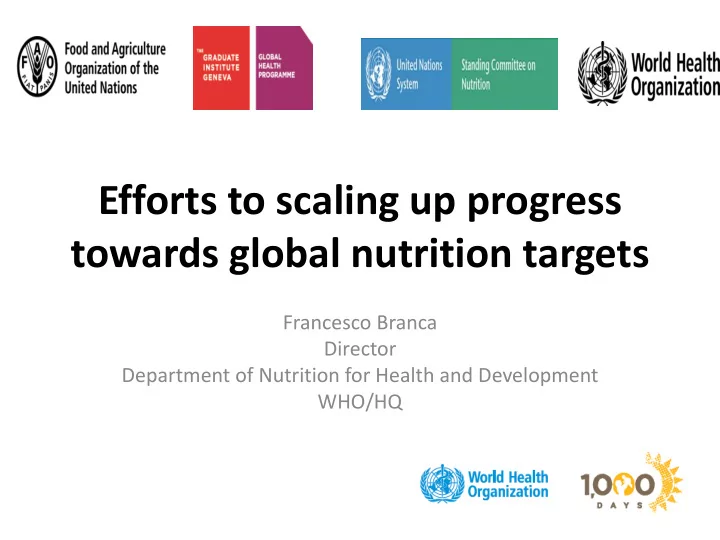

Efforts to scaling up progress towards global nutrition targets Francesco Branca Director Department of Nutrition for Health and Development WHO/HQ
The world is off track to meet all six of the WHA global nutrition targets
How to help progress ? • Set targets at country level • Assess the resources available • Ensure development policies and programmes include nutrition • Create links between different sectors as well as different stakeholders • Develop and implement suitable monitoring and evaluation mechanisms
• Guide national and local policy-makers on what actions should be taken at scale in order to achieve the targets • Evidence-based, effective interventions • Both nutrition-specific and nutrition-sensitive investments at the policy, health-system and community levels
identify, measure and understand stunting develop policies and interventions to improve maternal nutrition and health, beginning with adolescent girls implement interventions for improved exclusive breastfeeding and complementary feeding practices implement community-based interventions : water, sanitation and hygiene (WASH), protection from diarrhoeal diseases and malaria, intestinal worms and environmental causes of subclinical infection
identify, measure and understand anaemia among women of reproductive age scale up coverage of prevention and treatment activities develop comprehensive food policies for nutrition and nutrition-sensitive actions monitor and evaluate the implementation of anaemia control programmes
improve nutrition for adolescent girls, smoking cessation, facility births, intermittent iron and folic acid supplementation, prevention of malaria antenatal and postnatal care interventions women’s empowerment and educational attainment, social protection, food-distribution, clean and adequate water, sanitation and hygiene, facility-based perinatal care, salt iodization
early life exposures to improve nutritional status and growth patterns community understanding and social norms marketing of foods food system and food environment Community actions
hospital- and health facilities- based capacity to support exclusive breastfeeding training community-based strategies to support exclusive breastfeeding monitoring, enforcement and legislation on the International Code of Marketing of Breast-milk Substitutes six months of mandatory paid maternity leave
identify, measure and understand wasting & scale up coverage of services for the identification and treatment of wasting research and evidence on effective prevention strategies increase long-term funding for the prevention and treatment of acute malnutrition
Multiple forms of malnutrition • 805 million people chronically hungry • 161 million stunted children and 51 million wasted children • over two billion people suffer from micronutrient deficiencies • 42 million overweight children under five years of age and over 500 million obese adults
Over 2,200 participants including: • Representatives from more than 170 governments • Heads of State and Government and Royals • 85 Ministers and 23 Vice-Ministers from Foreign Affairs, Agriculture and Health • 100 Members of Parliament • 30 representatives of the UN System and IGOs • 150 representatives from civil society • 100 representatives from the private sector, consumer associations, and producer organizations • Many opinion leaders, researchers, and development experts
A vision for a world free from malnutrition • Coherent policies • Coordinated action among different actors and sectors • Diversified, balanced and healthy diet • Empowerment of consumers • National health systems integrating nutrition • Special attention to women
Ten Commitments Eradicate hunger and prevent all forms of malnutrition Increase investments Enhance sustainable food systems Raise the profile of nutrition Strengthen human and institutional capacities Strengthen and facilitate, contributions and action by all stakeholders Ensure healthy diets throughout the life course Create enabling environment for making informed choices Implement the commitments through the Framework for Action Integrate vision and commitments into the post-2015 agenda
60 policy and programme options in the Framework for Action • Sustainable food systems promoting healthy diets • International trade and investment • Nutrition education and information • Social protection • Health systems delivery of direct nutrition interventions and health services to improve nutrition • Water, sanitation and hygiene • Food safety
www.fao.org/ICN2 www.who.int/nutrition/topics/WHO_FAO_announce_ICN2/en/
Recommend
More recommend